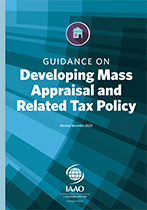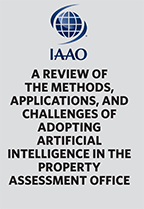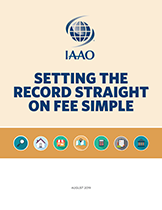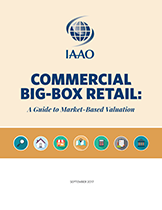IAAO Technical Standards
International Association of Assessing Officers (IAAO) maintains technical standards that reflect the official position of IAAO on various topics related to property tax administration, property tax policy, and valuation of property including mass appraisal and related disciplines. These standards are adopted by the IAAO Board of Directors.
IAAO assessment standards represent a consensus in the assessing profession. The objective of the IAAO standards is to provide a systematic means by which assessing officers can improve and standardize the operation of their offices. The IAAO standards are advisory in nature and the use of, or compliance with, these standards is purely voluntary. If any portion of these standards is found to be in conflict with the Uniform Standards of Professional Appraisal Practice (USPAP) or state laws, USPAP and state laws shall govern.
IAAO technical standards are intended to guide property tax assessment officials, tax policy analysts, and administrators. Similar issues arise in any nation’s property tax systems. IAAO standards can provide guidance internationally. However, certain sections of these standards apply primarily to the United States and Canada, where the power to tax property is assigned to state, provincial, or territorial governments.
IAAO makes its technical standards publicly accessible on its Web site. Newer technical standards can also be purchased individually through Amazon.
IAAO allows reproduction of technical standards for personal use, educational purposes, property tax hearings, legislative development, as a supplement to local guidelines and standards, and for public information purposes. The content of IAAO technical standards are subject to change. Current official versions of technical standards are available only from IAAO. When citing a technical standard in other documents it is advisable to include the date the referenced standard was approved and a link to the current version on the IAAO website. IAAO also recommends reviewing references to IAAO technical standards annually to ensure that citations are still applicable.
Users of IAAO technical standards should request permission to use them for the stated purposes. Requests for permission to reproduce all or a portion of the technical standards can be sent to the Technical Standards staff liaison, Shannon Hiss at hiss@iaao.org. If a portion of a standard is used for the stated purposes, IAAO asks that the entire standard be cited in a bibliography or reference list. IAAO technical standards are intended to be read in the context of the entire document.
IAAO technical standards are protected by copyright. No part of IAAO technical standards may be reproduced in any form, in an electronic retrieval system or otherwise, without the prior written permission of the publisher.
November 2023
This document, although not an IAAO Standard, was developed to provide guidance on developing mass appraisal systems from the collective experiences and lessons of valuation practitioners. The primary focus is on mass appraisal for value-based recurrent property taxes (also known as “rates on property”). However, the principles presented here are also relevant to mass appraisal for other governmental and public purposes.
IAAO PAPERS
A Review of the Methods, Applications, and Challenges of Adopting Artificial Intelligence in the Property Assessment Office
January 2022
This white paper delivers an introduction and overview of AI through case and pilot studies and review of relevant analytic methods while touching on possible organizational impacts.

The paper looks at the changing role of valuers and assessment administrators and the evolution of valuation offices where AI will be used to improve operations, value estimates, and administration. It provides illustrative examples of AI use in the conduct of tax assessment, including the administrative aspects not directly involved in valuation. While there is substantial fanfare around valuation with AI, many of the benefits to be realized from the technology are in areas of administration, validation, and oversight. This is reflected in the case studies included, with more than half involving AI applications outside of the explicit valuation function.
August 2019
This IAAO paper addresses issues regarding the term fee simple, or more appropriately, fee simple absolute.

Although it is probably good practice to use the word ‘absolute’ whenever one is referring to an estate in fee simple that is free of special limitation, condition subsequent, or executory limitation, lawyers frequently refer to such an estate as a ‘fee simple’ or even as a ‘fee.’ The term ‘fee simple’ or ‘estate in fee simple’ is a generic term.”
The fee simple estate is the foundation of what assessors in many jurisdictions are asked to examine, and clarifying this concept will assist assessors, appraisers, the courts, and others in the appraisal community in maintaining consistency, credibility, and uniformity in assessment and appraisal practices.
September 2017
This IAAO position paper provides guidance for the valuation of big-box retail properties. Over the last several years, issues involving these properties and theories about how to value them, such as the dark store theory, have resulted in great debate within both the appraisal and legal communities.
Even though this paper concentrates on arriving at the market value of the fee simple interest of these properties, it provides guidance regardless of the specific law of a jurisdiction.
This analysis focuses on big-box retail stores from 50,000 to 200,000-plus square feet; however, the market trend for big-box retail is shifting to both smaller and larger stores. For example, one major retailer has six different prototype stores varying from 15,000 to 260,000 square feet, depending on the characteristics of the trade area. The concepts discussed in this paper apply to single-tenant retail stores of any size and also to other property types.
Research and Standards Committee
The Research and Standards Committee supports the mission and goals of IAAO by developing and maintaining technical standards of professional practice. The committee responds to inquiries about technical issues contained within technical standards. The committee's role is to ensure that IAAO maintains a leadership role by providing professional standards for the industry.
Copyright Notice
IAAO technical standards are protected by copyright.
IAAO reserves all rights inherent to copyright protection.